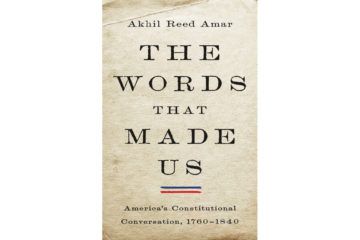Barbara Spindel in The Christian Science Monitor:
 Who wrote the Declaration of Independence? Thomas Jefferson is generally credited as its author, but Akhil Reed Amar believes there’s a better answer. “America did,” Amar argues in “The Words That Made Us: America’s Constitutional Conversation, 1760-1840.”
Who wrote the Declaration of Independence? Thomas Jefferson is generally credited as its author, but Akhil Reed Amar believes there’s a better answer. “America did,” Amar argues in “The Words That Made Us: America’s Constitutional Conversation, 1760-1840.”
Amar’s fresh and fascinating history focuses on the explosion of impassioned discourse that culminated in, and followed, the ratification of the U.S. Constitution. The book elevates the importance of dialogue and debate in cementing American identity. Of the declaration, for instance, the author observes that it “undoubtedly was a tool to win the war – an instrument in one sense no different from a musket or a ship.” Unlike the weaponry of the American Revolution, however, the Declaration of Independence “aimed to win a war by winning men’s minds – by reason and rhetoric, by persuasion, by conversation of a certain sort. Muskets and ships cannot do this.”
Amar covers familiar events in the run-up to the Revolution, including Colonial resistance to the 1764 Sugar Act and the 1765 Stamp Act. But he begins his narrative with a less well-known episode, tracing the ideological origins of the war to Paxton’s Case. In this intricate 1761 Massachusetts lawsuit, lawyer James Otis Jr., representing a group of Boston merchants, argued that writs of assistance – orders that allowed provincial customs officers to search Colonial property for smuggled goods – violated colonists’ rights
More here.
